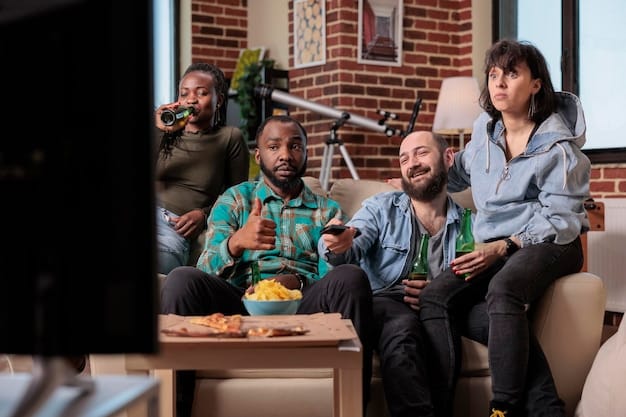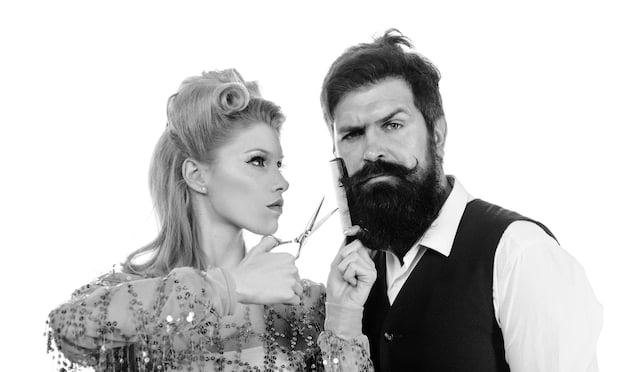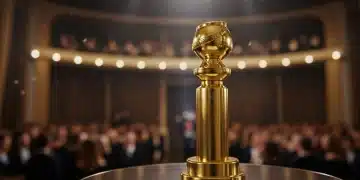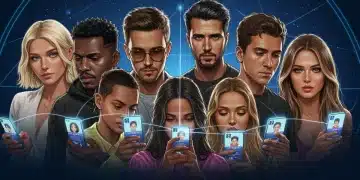How Award Show Speeches Influence Public Opinion: A Case Study

Award show speeches have significantly shaped public opinion by spotlighting social issues, promoting specific agendas, and altering perceptions of celebrities and their causes, consequently intensifying public discourse and sometimes sparking tangible social change.
Award show speeches have evolved beyond mere expressions of gratitude, often becoming powerful platforms for influencing public opinion. Let’s examine how this works, in this case study of how how award show speeches shape public opinion: a case study.
The Evolution of Award Show Speeches
Award show speeches were initially designed as platforms for honorees to acknowledge their achievements and thank those who supported them. Over time, these speeches have transformed into something much more impactful.
Early Forms of Acceptance Speeches
In the early days of award shows, speeches were generally brief and focused on gratitude. However, even these early forms contained the seeds of social commentary and influence, though the primary aim was to express thanks and humility.
The Shift Towards Social Commentary
The late 20th and early 21st centuries saw a gradual shift toward using these platforms to address pressing social and political issues. Celebrities began to leverage their fame to speak out on subjects ranging from civil rights to environmental protection.
- Increased Awareness: Celebrities bring attention to critical issues.
- Platform Expansion: Social media amplifies the reach of these speeches.
- Personal Connection: Honest speeches create an emotional bond with the audience.
This evolution has turned award show speeches into a medium for influencing public opinion, capable of shaping attitudes and behaviors on a large scale.

Historical Impact: Landmark Speeches
Several landmark speeches have played pivotal roles in shaping public opinion and catalyzing social movements. These moments underscore the significance of award show speeches as vehicles for change.
Marlon Brando’s Protest (1973)
One of the most poignant examples is Marlon Brando’s refusal of the Best Actor Oscar in 1973, where Sacheen Littlefeather spoke on his behalf about the mistreatment of Native Americans in the film industry. This single act brought national attention to issues that had long been ignored.
Other Significant Moments
Many other speeches have left indelible marks. From political statements to advocacy for LGBTQ+ rights, award shows have provided a stage for voices that resonate beyond the entertainment world.
- Shift in Cultural Discourse: They challenge prevailing norms and spark debates.
- Heightened Social Responsibility: Celebrities are increasingly expected to take a stand.
- Mobilization of Activism: Speeches can inspire real-world action.
These historical moments serve as a powerful demonstration of how award show speeches can indeed shape public opinion and inspire social action.
How Speeches Influence Perceptions
The influence of award show speeches on public opinion isn’t merely about what is said; it also involves *how* it is said and *who* is saying it. The emotional connection and personal storytelling enhance the impact massively.
Emotional Connection and Storytelling
Personal anecdotes and emotional appeals are powerful tools. When a celebrity shares a personal experience, the audience is more likely to empathize and connect with the message.
The Halo Effect of Celebrity
The “halo effect” suggests that people tend to transfer positive feelings about a celebrity to the causes or ideas they support. This can significantly boost the credibility and acceptance of their message.
The combined power of emotional resonance and celebrity status makes award show speeches a potent vehicle for shaping viewers’ perceptions and beliefs.

Case Studies: Impact on Social Issues
Several case studies highlight how award show speeches have specifically influenced public discourse and attitudes towards social issues. By examining these examples, we can understand the scope and depth of their impact.
LGBTQ+ Rights Advocacy
Speeches advocating for LGBTQ+ rights have played a crucial role in increasing acceptance and understanding. These moments often involve personal stories, making the issues more relatable and human.
Climate Change Awareness
Celebrities have used award shows to raise awareness about climate change, often calling for action. These speeches can spur public interest in environmental issues and promote more sustainable lifestyles.
- Increased Social Dialogue: Public discussion is amplified.
- Policy Influence: Policymakers may respond to widespread public support.
- Long-term Change: Incremental attitudinal shifts lead to broader social transformation.
These case studies underline the potential of award show speeches to initiate and sustain meaningful social change. They turn what might have been fleeting moments of entertainment into more lasting social influence.
Critiques and Limitations
While award show speeches can be influential, it’s important to acknowledge their potential downsides and limitations. Critiques often focus on perceived hypocrisy and ineffective advocacy.
Accusations of Performative Activism
Some critics accuse celebrities of “performative activism,” suggesting their advocacy is merely for show and doesn’t result in meaningful action. The lack of follow-through can undermine their credibility.
Echo Chambers and Limited Reach
Award shows typically reach a specific demographic, and the messages often stay within an echo chamber. This limited reach can prevent the speeches from influencing a broader audience.
Acknowledging these limitations ensures a balanced understanding of the influence of award show speeches on public opinion, recognizing both their potential and their shortcomings.
The Future of Award Show Activism
As award shows continue to evolve, the role of speeches in shaping public opinion is likely to become even more significant. Analyzing current trends helps us anticipate what the future might hold.
Technological Amplification
Social media and digital platforms will continue to amplify the reach of these speeches. Real-time reactions and increased accessibility will likely increase their immediate impact.
Increased Authenticity and Accountability
Audiences are increasingly demanding authenticity; celebrities who offer genuine insights and commit to long-term advocacy are more likely to resonate with the public. Accountability will be key to maintaining trust and influence.
The trajectory suggests that award show speeches will remain a key platform for social and political commentary, provided the speakers remain authentic and actively engaged with the issues they address.
| Key Point | Brief Description |
|---|---|
| 🌟 The Evolution of Speeches | From gratitude to social commentary. |
| 🗣️ Landmark Moments | Speeches that sparked significant change. |
| 🤔 Perceptions Influencers | How emotional and celebrity power shape views. |
| 🚀 Future Outlook | Trends shaping social commentary at events. |
Frequently Asked Questions
▼
Award show speeches have evolved from mere thank-you addresses to platforms for social and political commentary, increasingly used to address pressing global issues and raise awareness.
▼
Marlon Brando famously declined his Oscar in 1973 to protest the mistreatment of Native Americans, showcasing how award shows can be used to highlight social injustices.
▼
Emotional connection boosts the impact of speeches by creating empathy, making audiences more receptive to the speaker’s message and more likely to connect deeply with the issues.
▼
Critics often raise concerns about performative activism, suggesting that some celebrity advocacy might be superficial and lack meaningful follow-through, thus diminishing their credibility.
▼
The future will involve increased authenticity in award show speeches, with an emphasis on social media’s amplification effect as well as increasing demands for accountability and genuine commitment.
Conclusion
Award show speeches shape public opinion through emotional connection, impactful messages, and increasing visibility. The future will hinge on authenticity and tangible actions behind the words.





